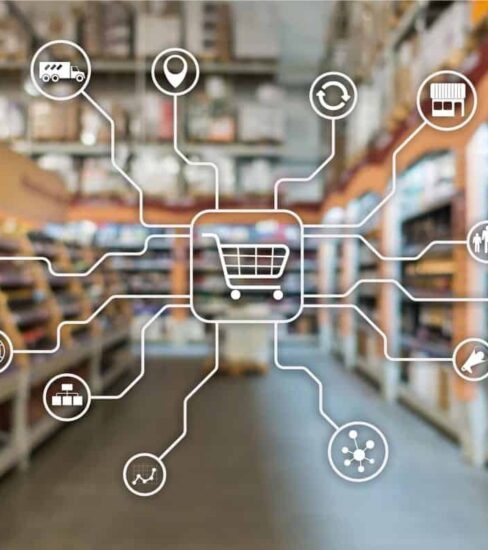An enterprise resource planning (ERP) system is a complex software tool that helps a variety of organizations to manage their everyday business operations. From manufacturing units to e-commerce stores, everybody needs an ERP. Most ERP products have certain things in common. They help businesses do their accounts, manage backend administration, provide customer service with the help of a CRM module, and manage staff.
However, in recent years ERP tools have diversified and have started to cater to specific industries. Hence, it is common to find ERP products targeted explicitly at manufacturing, retail, healthcare, and other industries.
In this article, let's look at how a Retail ERP system differs from other traditional ERP systems.
What is a Retail ERP?
Retail ERP works in real time to integrate various business operations and processes unique to the retail industry. It helps retail companies to streamline their processes and automate most of their manual tasks. It is important to remember and specify that a retail ERP can do almost anything that a traditional ERP does, but has additional retail-oriented features.
In recent years, retailers have had to bring a multichannel shopping experience to customers across brick-and-mortar stores, websites, and social media platforms. Retail ERP ensures businesses manage their warehouses and inventory in real-time so that order fulfillment takes place seamlessly across all channels. In addition, it also helps facilitate refund processing and implement loyalty management, generate reports and analyses, and process payments on point-of-sale systems.
In short, a Retail ERP is more than just a back-office tool that works behind the scenes. Unlike other ERP products, it actively helps retailers manage backend and front-end processes seamlessly.
Key Benefits of Retail ERP vs. Traditional ERP
| Retail ERP | Traditional ERP |
| Helps you implement a multichannel customer experience. | Focuses on the overall backend operations of a business and may not offer modules to process payments on POS, implement multichannel order fulfillment, etc. |
| Enables rapid order fulfillment, whether customers shop online or offline, thanks to seamless, real-time data synchronization across channels. | You may need to integrate it with third-party applications for complete cross-channel connectivity. |
| Includes a retail-oriented warehouse management system that helps retailers quickly convey products from the warehouse to the customer | May include a warehouse management module, but it is more targeted at manufacturers and production units |
| Allows process payments on PoS devices, social media channels, and web checkout pages, all from one unified system. | Has to synchronize data from multiple commerce platforms such as Shopify or Magento, resulting in duplicate databases. |
| Rarely requires further customizations or integrations. | May require customization and integration with multiple third-party applications to address business processes specific to the retail industry |
| Can be adapted to cater to niche retail verticals like fashion, hospitality, groceries, etc. | Often more generic and may require additional developments for specific functions. |
| Retail ERP systems are usually delivered via the cloud or as a source application. | Traditional ERP systems are often deployed on-premise. |
| Usually delivered as SaaS. Some vendors may also base their prices on the number of processed transactions. | Traditional ERP systems are more expensive as they usually require a vast range of generic, built-in modules. |
| Retail ERP implementation is not always a lengthy process. | Deployment and implementation often take a long time and require multiple resources. |
Why choose a Retail ERP?
Retail ERP is essential for smooth Retail operations.
Most retail businesses find it challenging to manage dispersed business functions – such as warehouse management, inventory control, replenishment, planning and forecasting, and customer relations.
A comprehensive ERP retail management software provides businesses with a single point of contact for all stakeholders while saving valuable time and resources, helping them make informed decisions, and eliminating the need for multiple solutions for different functions.
A robust retail ERP offers a complete overview of the business's functions and allows drill down to the SKU or item level.
A modern retail ERP provides retailers with advanced capabilities to manage and control all business processes, including supply chain, financial management, inventory, and accurate demand forecasts, and gain real-time visibility while seamlessly fulfilling orders and maintaining customer satisfaction.
Retail ERP helps retailers provide customers with a multichannel shopping experience.
65% of e-commerce traffic originates from mobile devices, and 53% of e-commerce transactions are carried out on mobile devices. Modern ERP tools like Priority Retail ERP help you control all your online and offline commerce channels and business operations from a unified interface to provide customers with a seamless shopping experience, online and offline.
Retail ERP helps retailers easily manage loyalty programs.
Loyalty management is an essential aspect of the retail industry. Using a customer loyalty management solution will help retain customers who are often tempted to buy from your competitors. Priority Retail allows retailers to uncover their customers' preferences, customize and automate their POS processes, craft personalized promo campaigns, and apply cross-channel, cross-brand, and cross-vertical loyalty programs, all from a single, centralized cloud-based Head Office management console.
Retail ERP helps retailers maintain business continuity.
A unified retail ERP platform supports business continuity by remaining fully operational in both online and offline modes. Mobile POS terminals can remain entirely functional with no internet/electricity, providing the optimal solution for pop-up stores and other remote sales outlets.
If you are a retailer, you need a Retail ERP.
Retail ERP is essential for efficient retail business management. It helps bring an omnichannel shopping experience to customers while ensuring that all backend processes run smoothly. Thanks to a unified database that is constantly updated, it is easy for retail stores to liaise with different stakeholders such as distributors, manufacturers, and importers.
Up-to-date information helps retailers to perform complex logistic operations seamlessly, all while maintaining a real-time overview of their business, contributing to enhanced customer satisfaction.


